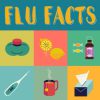As we head into the fall season, Consulate Health Care would like to share information to help everyone avoid contracting flu this year. Review these facts to help stay healthy throughout the season.
What is flu?
Flu is a contagious respiratory illness caused by influenza viruses that infect the nose, throat, and lungs.
When is flu season?
According to the Centers for Disease Control (CDC), flu viruses are most common during the fall and winter. Most of the time, flu activity peaks between December and February, although activity can last as late as May.
Preventing flu:
Flu can cause mild to severe illness, and the single best way to prevent flu is to get the flu vaccine. Washing your hands will also help protect you and others from catching flu. Use soap and water when possible, or use an alcohol-based hand sanitizer. Read these additional tips to prevent flu.
How effective is the flu vaccine?
The CDC conducts studies each year to determine how well the flu vaccine protects against flu illness. While vaccine effectiveness can vary, recent studies show vaccine reduces the risk of flu illness by about 50% to 60% among the overall population during seasons when most circulating flu viruses are like the vaccine viruses. Another study published in the summer of 2016 showed that people 50 years and older who got a flu vaccine reduced their risk of getting hospitalized from flu by 57%.
Signs and symptoms of flu:
- Fever* or feeling feverish/chills
- Cough
- Sore throat
- Runny or stuffy nose
- Muscle or body aches
- Headaches
- Fatigue
- Some people may have vomiting and diarrhea, though this is more common in children than adults.
*It’s important to note that not everyone with flu will have a fever.
When is flu contagious?
Most healthy adults may be able to infect others beginning one day before symptoms develop and up to five to seven days after becoming sick.
Treating flu
Most people with flu have mild illness and do not need medical care or antiviral drugs. If you get sick with flu symptoms, in most cases, you should stay home and avoid contact with other people except to get medical care. If, however, you have symptoms of flu and are in a high risk group, or are very sick or worried about your illness, contact your health care provider.
If you found an error, highlight it and press Shift + Enter or click here to inform us.



